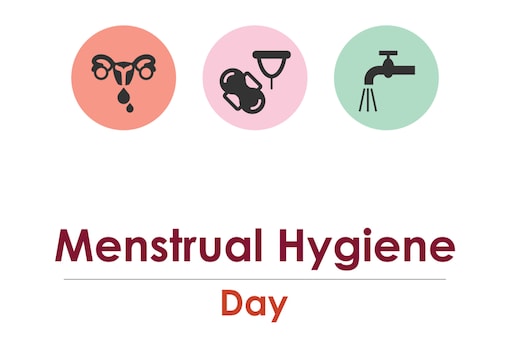May 28: Menstrual Hygiene Day

Introduction
May 28 is observed as the Menstrual Hygiene Day. Every woman experiences a monthly biological cycle known as menstruation or a period, where the lining of the uterus breaks down and leaves the body through the vagina i.e endometrium. Menstruation and menstrual hygiene continue to be met with silence and neglect all around the world. The mission of this day is to break the silence and taboo, raise awareness and change negative social norms surrounding menstrual hygiene management in the world.
Why May 28?
According to Water and sanitation for health ( WASH)United, a German non-profit organization and founder of the Menstrual Hygiene Day, the average interval of a menstrual cycle is 28 days. On average, women and girls menstruate for 5 days per month. Hence 28-5, or the 28th of May was chosen to mark this day.
History
Water and sanitation for health United came up with the idea for a global day of action for Menstrual Hygiene Management in May 2013. The organization carried out a 28-day campaign on social media to test the waters and see if other organizations were interested in this issue, too.
Importance Of Menstrual Hygiene Day
Poor menstrual hygiene caused by a lack of education and awareness on the issue, persisting taboos and stigma, limited access to hygienic menstrual products, and poor sanitation infrastructure undermines the educational opportunities, health, and overall social status of women and girls around the world, says WASH United.
As a result, millions of women and girls are kept from reaching their full potential.
At this stage, this issue needs the spotlight of a dedicated day to break the silence and accelerate action, the organization says on the importance of the day.
Significance
With Menstrual Hygiene day, not just WASH United, but several organizations and activists involved in the cause, aim to create a world where no woman or girl is held back because she menstruates, by 2030.
To ensure a world without period stigma and period poverty, every woman and girl needs to be empowered to manage her menstruation safely, hygienically, with confidence, and without shame.
COVID-19 And Menstrual Hygiene
Since the outbreak of COVID-19 and the subsequent lockdowns, it has become clear that the pandemic has severe secondary impacts on girls’ and women’s ability to manage their menstruation and their health.
As per many experts and organizations, the poorest sections of the society were the worst affected in accessing menstrual hygiene products during the pandemic.
However, a recent analysis by UNICEF titled ‘Mitigating the impacts of COVID-19 and menstrual health and hygiene, shows that it is not just them, but also the healthcare workers who are on the frontlines of fighting the virus.
Globally, women make up 70 per cent of the health workforce and are more likely to be front-line health
workers, especially nurses, midwives and community health workers. These women face additional challenges in managing their menstruation, which may compromise their health and dignity as well as the ability of the health system to deliver.
As per the UNICEF report, these challenges include, but are not limited to:
Facility managers are not aware of and/or do not prioritize the Menstrual hygiene needs of female health care workers. Lack of menstrual hygiene materials for health care workers provided by health systems. Putting on and removing PPE prevents quick changing of menstrual hygiene materials, leading women to bleed into protective suits, suppress menstruation through the use of oral contraceptive pills, or potentially miss 5 days of work. Lack of access to WASH facilities at health care facilities, preventing women from managing basic hygiene including menstrual hygiene while at work.
How to manage it?
Building clean toilets with uninterrupted water supply in rural schools, ensuring the availability and accessibility of sanitary napkins, and imposing mandatory menstrual health classes for both boys and girls can create an enabling environment for girls and prevent them from potentially dropping out of school.
We must also ensure that all women have access to quality sanitary pads or other hygienic methods of protection, even in emergencies.
There is also a need to educate women and girls about the environmental pollution and health hazards associated with the disposal of sanitary napkins. Studies show that a woman generates 125kg of sanitary waste, on average, during her menstruating years when she uses disposable sanitary products.
Awareness about the use of natural sanitary products made from materials like banana fiber, bamboo fiber, etc., is equally essential. Civil society organizations’ actions and others working with rural women have introduced the idea of setting up low-cost sanitary napkin units, which also provide livelihood opportunities to rural women, but many women and girls in remote areas are yet to be reached.
The private sector also has a crucial role to play by funding the installation of sanitary-pad vending machines in secondary schools for girls in rural areas through their CSR initiatives. Such initiatives, along with WASH (water, sanitation and hygiene) and MHM awareness campaigns, have the potential to drastically improve women and girls’ menstrual health outcomes. Finally, educational institutions and workplaces must consider the option of menstrual leaves for those women and girls experiencing extreme pain and discomfort during their periods.
An informed discourse around menstrual hygiene has gained momentum in recent years, but we have miles to go before we achieve our ultimate goal of ensuring that every woman or girl has an understanding of her menstrual health needs and access to related products and services.
On this Menstrual Hygiene Day
” Let us pledge to ensure that menstruation will not impede our young girls and their aspirations.”
CLICK HERE TO BUY OUR FIRST EDITION OF THE MAGAZINE AT A FLAT 25% DISCOUNT USE CODE “MAGAZINE”
NOW AVAILABLE ON AMAZON

Written By: Ritika Jain, 3rd Year BDS, Government Dental College, Raipur, Chattisgarh
